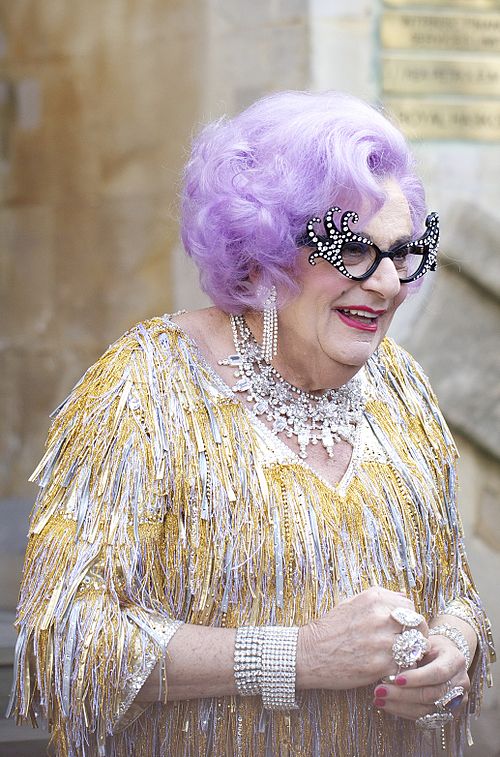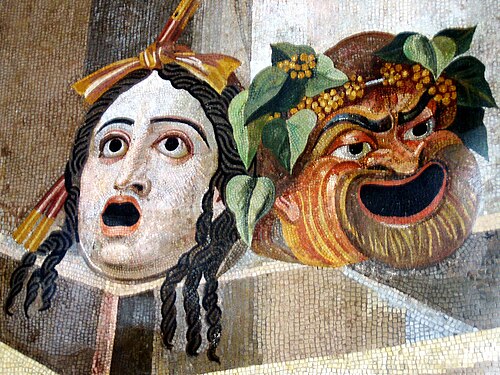Comedynoun
A choric song of celebration or revel, especially in Ancient Greece.
Comedynoun
(countable) A light, amusing play with a happy ending.
Comedynoun
A narrative poem with an agreeable ending (e.g., The Divine Comedy).
Comedynoun
A dramatic work that is light and humorous or satirical in tone.
Comedynoun
(drama) The genre of such works.
Comedynoun
(uncountable) Entertainment composed of jokes, satire, or humorous performance.
Comedynoun
The art of composing comedy.
Comedynoun
(countable) A humorous event.
Comedynoun
A dramatic composition, or representation of a bright and amusing character, based upon the foibles of individuals, the manners of society, or the ludicrous events or accidents of life; a play in which mirth predominates and the termination of the plot is happy; - opposed to tragedy.
Comedynoun
light and humorous drama with a happy ending
Comedynoun
a comic incident or series of incidents
Comedynoun
professional entertainment consisting of jokes and sketches, intended to make an audience laugh
Comedynoun
a film, play, or broadcast programme intended to make an audience laugh
Comedynoun
the style or genre represented by comedy films, plays, and broadcast programmes
Comedynoun
the humorous or amusing aspects of something
Comedynoun
a play characterized by its humorous or satirical tone and its depiction of amusing people or incidents, in which the characters ultimately triumph over adversity
Comedynoun
the dramatic genre represented by comedies
Comedy
Comedy (from the Greek: κωμῳδία, kōmōdía) is a genre of fiction comprised of discourses or works intended to be humorous or amusing by inducing laughter, especially in theatre, film, stand-up comedy, television, radio, books, or any other entertainment medium. The term originated in Ancient Greece: in Athenian democracy, the public opinion of voters was influenced by political satire performed by comic poets in theaters.
Humournoun
(uncountable) The quality of being amusing, comical, funny.
Humournoun
(uncountable) A mood, especially a bad mood; a temporary state of mind or disposition brought upon by an event; an abrupt illogical inclination or whim.
Humournoun
Any of the fluids in an animal body, especially the four "cardinal humours" of blood, yellow bile, black bile and phlegm that were believed to control the health and mood of the human body.
Humournoun
(medicine) Either of the two regions of liquid within the eyeball, the aqueous humour and vitreous humour.
Humournoun
(obsolete) Moist vapour, moisture.
Humourverb
(transitive) To pacify by indulging.
Humournoun
same as humor.
Humournoun
a characteristic (habitual or relatively temporary) state of feeling;
Humournoun
a message whose ingenuity or verbal skill or incongruity has the power to evoke laughter
Humournoun
(Middle Ages) one of the four fluids in the body whose balance was believed to determine your emotional and physical state;
Humournoun
the liquid parts of the body
Humournoun
the quality of being funny;
Humournoun
the trait of appreciating (and being able to express) the humorous;
Humourverb
put into a good mood
Humournoun
the quality of being amusing or comic, especially as expressed in literature or speech
Humournoun
the ability to express humour or amuse other people
Humournoun
a mood or state of mind
Humournoun
an inclination or whim
Humournoun
each of the four chief fluids of the body (blood, phlegm, yellow bile (choler), and black bile (melancholy)) that were thought to determine a person's physical and mental qualities by the relative proportions in which they were present.
Humourverb
comply with the wishes of (someone) in order to keep them content, however unreasonable such wishes might be
Humourverb
adapt or accommodate oneself to (something)
Humour
Humour (Commonwealth English) or humor (American English) is the tendency of experiences to provoke laughter and provide amusement. The term derives from the humoral medicine of the ancient Greeks, which taught that the balance of fluids in the human body, known as humours (Latin: humor, ), controlled human health and emotion.



























